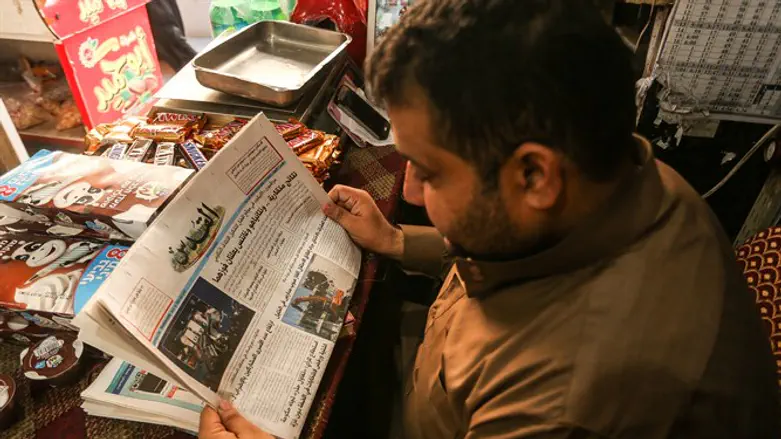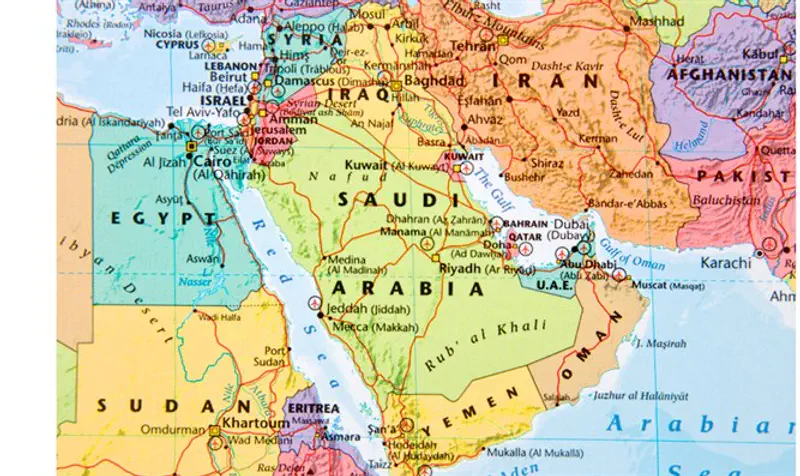
Arab journalist Hadeel Oueis reports from Washington D.C. for Arabic news outlets. She spoke to Arutz Sheva about reactions among Arabs to Binyamin Netanyahu's election victory.
You reported at the beginning of March details of President Trump’s Deal of the Century. It was rumored that the deal would include recognition of Israel by surrounding Arab countries, but would also involve heavy Israeli land concessions, including Jerusalem.
I'd like to ask you about reactions among Arabs, Muslims, both Sunni and Shia, and those of Christians in the Middle East, to Israel's election results.
"Here I talk on behalf of what the Arab youth think, and what we think is that the priorities in the Middle East have changed a lot recently, and especially what happened in my homeland, Syria, where Iran killed the biggest number of people.
"What happened actually in Syria was that a number of victims which is much bigger than any other conflict that took place between the Arabs and the Israelis in history, so priorities have changed for many people in the Arab world, like the Syrians. Years ago, Syrians knew that Iran is their main enemy. Iran is coming with heavy weapons to their cities, to Aleppo, to Damascus, to the beloved cities that they loved, and they grew up and they never saw an Israeli soldier in Damascus or in Aleppo or in Homs, but they saw Iranian militias with heavy weaponry, killing them, killing their kids, changing demography for the main Syrian cities. So priorities have changed for people like people of Syria, people of Iraq, people of Lebanon. Many of them have a daily struggle from Iranian militias, from the threat that Iran poses to the Arab cities. So many wouldn't consider destroying Israel as their goal, because on a daily basis they're suffering from something else, something more real and more related to their daily needs."

"Iran is not the only thing that came out to be a real enemy for the Arab youth recently; also many, many, many other players have supported enemies of the youth, like for example now the conflict taking place in the Gulf region between Qatar and the Arab countries, when Qatar did things the Arabs think are horrible, they also supported militias and players against the Arab main priorities. Qatar supported the Muslim Brotherhood, many people... And the Arab world, we shouldn't forget, is not only one kind of people, it's many kinds of people from different backgrounds, ethnicities, and religions. Some people see the Muslim Brotherhood as a real threat that's putting their interests in danger. Like, for example, the many groups of the Kurds in Syria, they were attacked in their own cities, and again, in their beloved cities, and that means a lot to them, and they've never seen an Israeli soldier there killing them. They saw militias backed by Qatar, backed by Turkey, backed by the Muslim Brotherhood attacking them, so here the priority has changed too, and they see these groups as the main enemy, not Israel.
"Because of all that, many of the Arab youth think that peace is what should happen between the Arabs and the Israelis, but also many other Arab youth like the Syrian youth, for example, always fear from a peace deal that's between regimes and not between peoples. For example, the Assad regime may give up anything to Israel, may give up anything in a deal with Netanyahu - this is what Syrian people believe - just to oppress them, to kill more of them, and to put more Syrian activists, peaceful activists, in jail. By just convincing the international world and convincing Israel that's believed to be powerful and to have good relations with the United States, regimes like Assad's just want to convince the international community that they are a good regime, that they are for peace, but at the expense of oppressing their people. And when they do that, the Arab youth won't be very excited about peace.
"This is why many of the Arab youth think continuously that the rule of Netanyahu will not help peace between Israeli people and Arab people. And again, I'm not talking about regimes, I'm talking about peace initiatives between the people. Because at the end of the day we are all Middle Easterners, we live in the same region, we have the very same struggles nowadays as I mentioned, the priorities of the Arab people, the things that really harm them, are really also struggles and challenges for the Israelis, like the political Islam of the Muslim Brotherhood that's also supporting Hamas in Gaza, and also on the other hand the Iranian threat. So there are many things mutual, priorities are changing, but the youth won't accept a peace deal that's first very, very unjust, and also they won't accept something that's just done to make regimes like Assad's in better shape and whitewash it in front of the international community by saying 'look, this regime is making an historical move by making peace with the Israelis', and this way we don't see that peace is happening for real because it's not based on a real basis between peoples."
A Lebanese journalist for al-Jadeed said in an interview that as a Lebanese citizen, he cares most about Israel's policies vis-à-vis Iran, who he said is playing a destructive role in Lebanon and the entire region.
He said “Netanyahu’s anti-Iran policies are welcomed warmly by the Arabs”.
He also said that Beirut and Lebanon are his top priorities and that for him, Beirut is more important than Jerusalem or the Golan Heights.
"I agree in the same context; it's about priorities, it's about who is harming you more, or who is harming you every day. Like my generation - I was born in 1992. I've never witnessed a war between the Arabs and the Israelis. I've never met someone from Syria who lost his father or mother or kids by an Israeli soldier. I've never met someone like that. I've never met victims of the Israeli-Arab conflicts; I know they existed and that brutal wars took place in the past, but our generation saw something way more brutal. If you ask someone from Duma in Syria, 'Who is your enemy?', they wouldn't tell you Israel of course, because each family lost two and three of their members by Iran's militias in a very brutal way, they just lost their kids in Assad's jails. So they have real struggles, big struggles, bigger than anything they witnessed from Israel...
"One last thing very interesting to mention is that after the last step from President Trump to acknowledge the Golan Heights as Israeli lands, and after President Putin gave the remains of the Israeli soldier to Israel, I saw many comments from hawks, what we call the Axis of Resistance that includes Hassan Nasrallah, Bashir al Assad, and Iran, many of those who used to support the Axis of Resistance to the end are now discussing that the behaviors of Iran, Assad, and Nasrallah when they wage wars with Israel, when they try to attack Israeli territory, it's just becoming a political way to have political gains for their political agenda, and so the acknowledgement of the importance of peace is everywhere in the Middle East, even among the Axis of Resistance. But as I said, people are different about it, the youth see it in a different way than regimes, and of course the Axis of Resistance see it in a different way as well."
